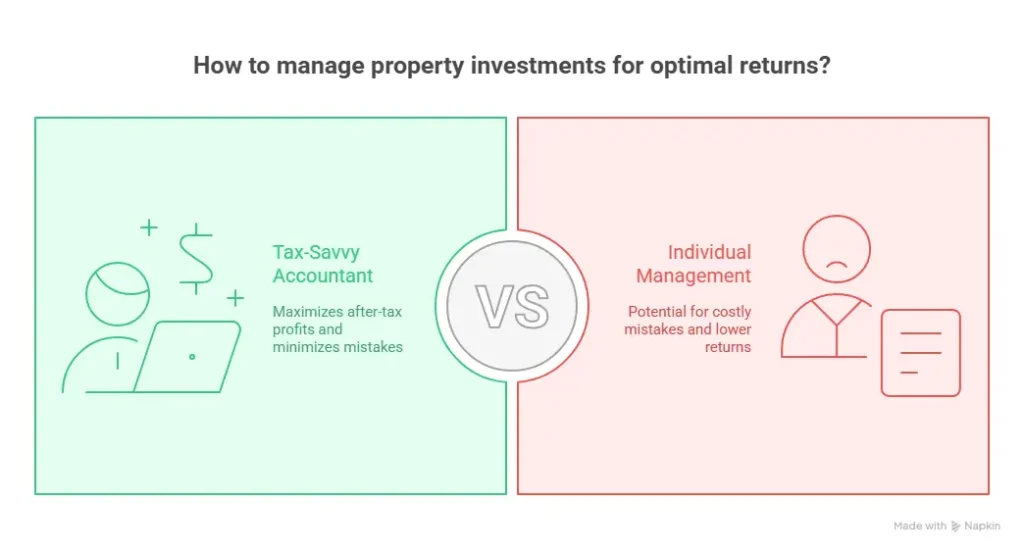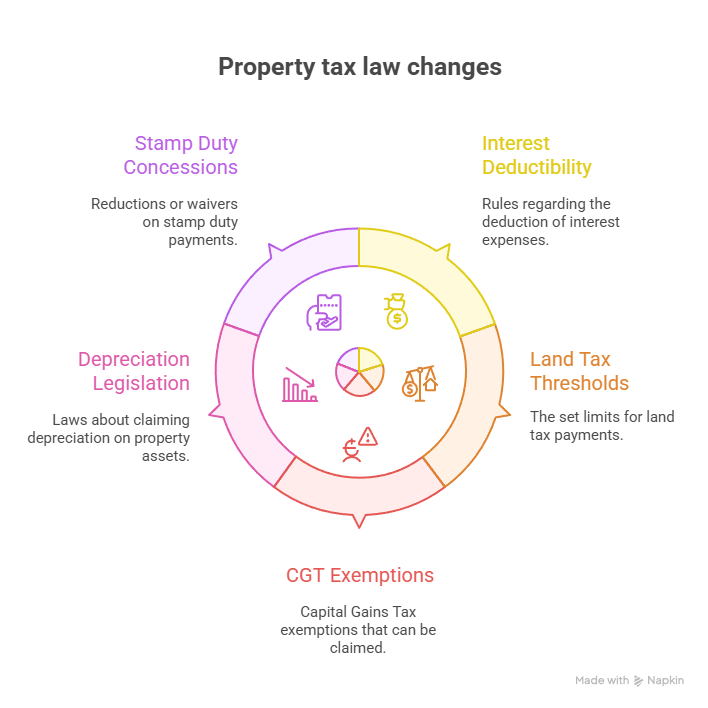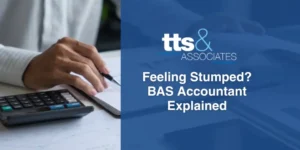A property investment accountant does more than prepare tax returns – they help you structure your property portfolio in a way that minimises tax and maximises your long-term returns. Whether you own one investment property or a portfolio of ten, having a tax-savvy advisor can significantly improve your after-tax profits and reduce costly mistakes. From selecting the best ownership structure to navigating capital gains tax and depreciation, a property-focused accountant brings long-term strategic value to serious investors.

Choosing the Right Ownership Structure
Your ownership structure will affect your tax outcome from day one. A property investment accountant will evaluate whether it’s better to purchase in your own name, jointly with a partner, or through a trust or company. Each structure has distinct tax implications:
Individual or Joint Ownership
Buying in your personal name means rental income and capital gains are taxed at your marginal rate. For couples, holding property jointly or in the lower earner’s name can reduce tax on rental profits. However, this also means you’re fully liable for capital gains tax (CGT) on sale.
Family Trust
A discretionary trust can allocate profits among beneficiaries – typically family members in lower tax brackets – offering flexibility and tax efficiency. Note that while rental losses can’t be distributed to individuals, trusts provide asset protection and can be useful for estate planning.
Company Ownership
While companies aren’t typically used for buy-and-hold residential properties (since they miss out on the 50% CGT discount and can’t pass on losses), they may be appropriate in specific scenarios like property development or capping profit at the corporate tax rate.
Getting this structure right from the start is critical. Transferring property between entities later on can trigger stamp duty and capital gains tax, costing thousands. A property investment accountant will model the most tax-effective approach for your situation.
Maximise Ongoing Tax Deductions and Benefits
A property investment accountant will help you claim every legal deduction, ensure you’re using depreciation effectively, and coordinate tax planning across multiple properties.
Negative Gearing and Tax Offsets
If your property is negatively geared (rental income is less than interest and expenses) those annual losses can offset your other income (like salary), reducing your overall tax bill (ato.gov.au). An accountant will ensure these deductions are correctly recorded and assist in planning for any tax refunds.
Depreciation Schedules
You can claim depreciation on the building structure (capital works) and on plant and equipment (e.g., air conditioners, carpets, hot water systems). A quantity surveyor report is typically required to claim these, and a property accountant will help organise and track these schedules over time. With multiple properties, managing depreciation correctly ensures you don’t miss out on thousands in deductions annually.
Timing Repairs and Upgrades
Strategically scheduling repairs and improvements can also help reduce tax. An accountant will guide you on whether a cost can be immediately deducted (as a repair) or depreciated over time (as a capital improvement). This planning smooths your taxable income and helps avoid bumping into higher tax brackets.
Capital Gains Tax Planning for Property Investors
At some point, you’ll likely sell one or more investment properties – and the capital gains tax (CGT) implications can be significant. A property investment accountant provides advanced planning strategies:
Capital Gains Tax Discount
If you’ve held a property for more than 12 months, you may be eligible for a 50% CGT discount (for individuals and trusts). Accountants will factor this in when estimating your future tax liability.
Timing the Sale
Selling in a year when your income is lower – for instance, if you’re taking time off work or semi-retiring – can result in the gain being taxed at a lower rate. A strategic accountant can forecast these scenarios and advise on the best time to sell.
Business vs. Investment Classification
Frequent property flippers may be classified as operating a business, meaning their profits are fully taxable as income and not eligible for CGT concessions. An experienced accountant ensures your transactions are classified correctly and flags potential ATO scrutiny.
Keeping Up with Tax Law Changes
Property tax laws are constantly evolving. A knowledgeable property investment accountant monitors changes to:
- Interest deductibility rules
- Land tax thresholds
- CGT exemptions
- Depreciation legislation
- Stamp duty concessions

They proactively adjust your strategy to stay compliant and avoid costly surprises.
Long-Term Strategic Value
Ultimately, a property investment accountant isn’t just for compliance – they’re a key advisor in your investment journey. With professional tax planning, you’ll:
- Save money through smart deductions
- Avoid audit triggers and mistakes
- Structure your portfolio for growth and flexibility
- Reduce capital gains tax on eventual exits
- Plan major purchases, upgrades, or sales strategically
Every dollar you save in tax is a dollar you keep in your pocket or reinvest into your next opportunity.
For more tips on reducing capital gains tax, see Top 5 Effective Tips for Australian Capital Gains Tax – or contact us for a chat.




